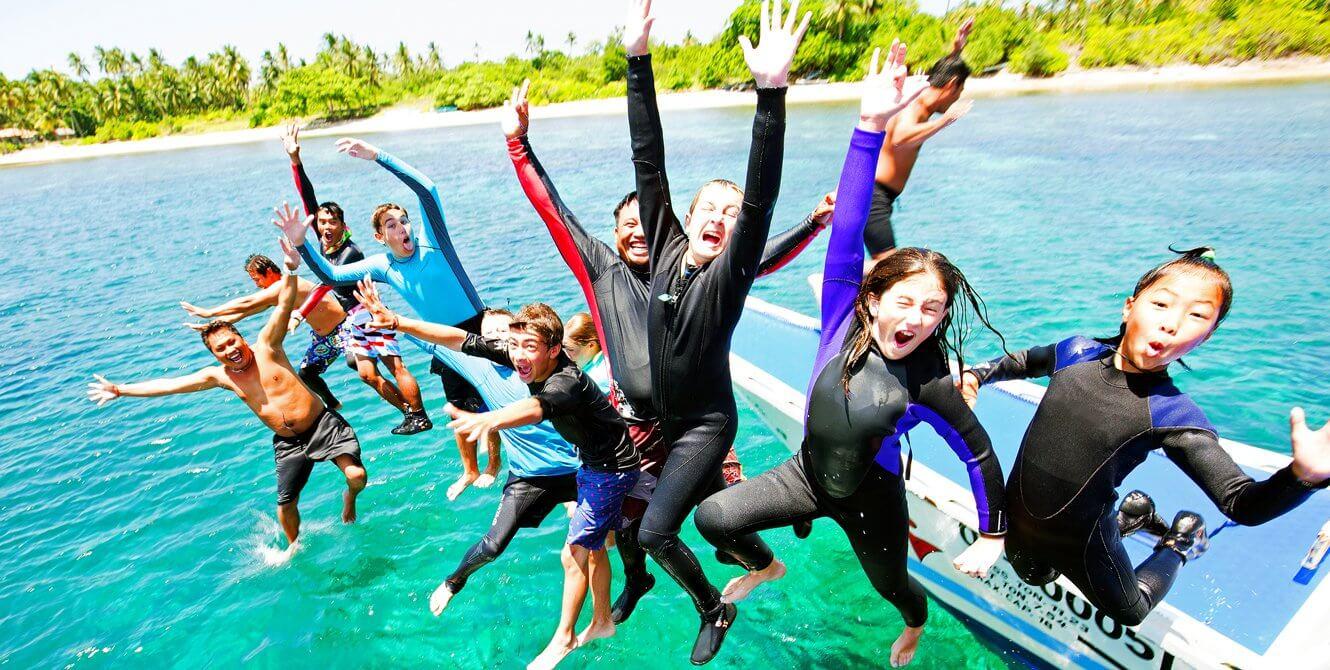Top tips for travel safety and being ready for emergencies.
Top 10 safety tips when taking a dive trip when booking a liveaboard dive trip.
Be prepared, ask the tough questions when searching for your next liveaboard trip. Make sure that you are qualified for the type of diving that is being offered. You should be fit and both physically and mentally prepared for liveaboard diving. Do not assume that there is one world book of mandates and laws that must be followed by all liveaboards around the world. It is your responsibility to be a competent diver so here are the safety tips when taking a dive trip. Why choose Kids Sea Camp?
Ask about dive gear needs, weights, types of boats, conditions, etc. Ask if the time of year your want to go is best for that destination. Make sure that you are comfortable with the number of guests onboard versus the staff. I personally do not dive on liveaboards with more than 16 passengers, I do not prefer shared bathrooms, and I do not ever go on boats that don’t offer professional active rescue trained and up to date divemasters or instructors in the water with divers.
I am very strict on my ratios when it comes to family and kids, my minimum is 1 DM to 5 certified divers in the water. It’s important that you feel comfortable in the conditions that liveaboard is going to be diving in and that you know what they are or can be. Request a fire drill, make sure systems and alarms are working.
Request and demand to see both sides of emergency exits. Have the staff show you how they open by demonstrating, so you can make sure it’s not blocked or painted shut and is working properly and easily. Know where the life jackets are and know where the exits to your cabins are. Do your research on how reputable the operator you considering is. Scuba board, Under Current, DAN, Under Current are just a few good resources to look up. Make sure your book with an experienced trustworthy agent. I am available 24/7 to my clients. My cell is on my card and believe it or not, I have made myself available to clients in trouble on trips that have not even been booked through me.
Below are Safety tips when taking a dive trip so you are ready to travel. This comes from my 30 years of expertise taking families and kids on both Land-Based and liveaboard trips around the world as well as from some close friends who have survived close calls.
- How many passengers and cabins are accommodated on your boats?
- What is the number of crew on the boat and are they all rescue trained and trained with fire drills.
- Do you have an emergency contingency plan in place and may I have a copy?
- Are your boats inspected and current with all licenses and inspection requirements?
- Do you have a sprinkler system on this boat and a fire detection system onboard?
- 6. Do you allow charging devices in individual cabins and are Lithium batteries allowed on your vessel.
- Do you have fire extinguishers and alarms in all cabins and rooms?
- Do you have a mandatory security night watch aboard your boats?
- I would like to know if there is an emergency contact list for guests with contact both locally and in the main corporate office?
- What are your ratios of divers in the water to staff and are dive staff professional certified, dive masters & instructors?
10 safety tips you can do to be prepared for an emergency when traveling:
1. Remove any second-tier verification codes from your email account. If you lose your cell phone and so does the rest of your family due to an unforeseen emergency, you will not have access to your verification code and will be locked out of your email account when you log in from a public Ip or foreign device not recognized by your server or google.
2. Create your own safety deposit box or emergency folder in the cloud. Put copies of your passports, dive cards, DAN insurance, or other, copy of your airline itinerary and the emergency contacts for you personally as well as for the airline, and liveaboard or resort or agent you working with. We all live in a push-button world and with smartphones remembering the numbers of our family and business is a thing of the past. If you lose your phone and computer you lose it all.
3. Keep a small emergency dry bag with you at all times. Keep it on your nightstand at night and keep it in your dry bag on your dive boat. Keep it with you at all times. Inside. Your cell phone, your passport or copy of your passport, copy of your airline ticket. a note with your most important numbers needed a small amount of money, and 1 credit card.
4. At night, make sure in your dry grab bag to have 1 pair of underwear, shirt, shorts, life-saving meds you can’t go without. This should not be large. You do not know the conditions you may be in.
5. Send a link to your emergency folder to your emergency contact at home not traveling with you.
6. Ensure your dive gear, and camera equipment, it can cost upwards of $14,000 to replace and take months to be paid for.
7. Make sure you have DAN Dive insurance, MASA, or USI (CFAR insurance). Rescue flights and chamber rides can cost tens to hundreds of thousands in a remote location to air vac you out.
8. Make sure that the people you traveling with have access to your emergency information to assist you if you are the person in trouble
9. Make sure the organization you are traveling with has great reviews online and take the time to look through them.
10. Pay it forward. If you have a great experience with an operator and they do a top-notch job all that should be in place is. Share it with others and post on Scuba Board, The dive magazine websites, and your multimedia. Let other divers learn from your experience.
Some great additional safety tips added from KSC staff: let’s hear what your suggestions or questions are. Let’s make diving safer for divers by making more informed and educated divers:
- Check what travel insurance you have and what you need.
- Have a list of items that you pack, even better lay them out in the “Tetris Challenge” style and take a picture (maybe even including yourself). The email that picture to contact and yourself or save on the cloud.
- Make copies of paperwork and email them to a close friend and to yourself or store them on the cloud.
- Make sure the “emergency contact form” is filled out properly and the person involved knows about this.
- Know at least one phone number to contact in your head.
Woody Tinsley: When you’re on a liveaboard I joined a group a few years ago and got the Nautilis lifeline and it’s on me with every boat dive and I keep it clipped to my safety sausage which if I had time to grab an emergency would be one of the only things I grab. But the lifeline broadcast your GPS location Internationally to every boat on an emergency frequency. I just had to attend SOLAS training because as a Police Diver I need to be signed off federally for national emergencies and stuff like that but anyway the training was put on by NOAA And it was really eye-opening. Boat drills consistently do abandon ship drills but nobody ever talks about what you should do in the water afterward?https://shop-nautiluslifeline-com.3dcartstores.com/
The Right Honourable Lord Woodrow F. Tinsley III D.o.D. HcLaird of Glencoe and LochaberCount of Hougun ManorBoston Sea RoversOwner of The Sharkiteuthis Diving Co.East Hartford Police #289
Article By Margo Peyton, Owner of Kids Sea Camp Inc. Family Dive Adventures PADI Instructor 57474

